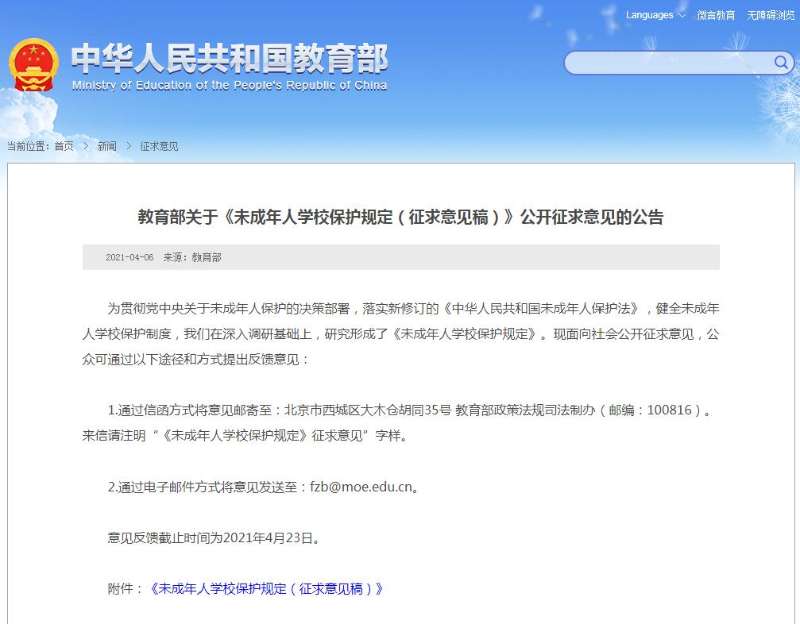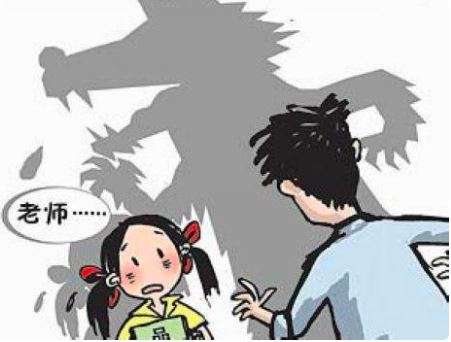China’s Ministry of Education intends to prohibit teacher-student relations in primary and secondary schools.
On Apr 6, the Ministry of Education began to solicit public opinions on the draft of the School Protection Order for Juveniles. The document pointed out that schools should prevent faculty and staff from establishing romantic relationships with underage students and improve regulations on student dormitory safety, surveillance cameras, and other systems, establishing a working mechanism for preventing and reporting sexual assault.

No. 35 of the “Order” clearly states that schools should take necessary measures to prevent and stop faculty and visitors to campus from committing the following behaviors that harm the physical and mental health of students:
- Having a romantic or sexual relationship with a student;
- Indecent behaviors such as deliberately touching private body parts of the student;
- Teasing or sexually suggestive behaviors to students;
- Showing students’ information, books, movies, pictures, or other materials that contain pornographic or obscene content;
- Holding obscene and pornographic materials that involve underage children;
- Other illegal and criminal acts which constitute sexual harassment and sexual assault.
In addition, schools should normalize sexual assault prevention education for students and parents based on students’ physical and mental development.

The current draft of the School Protection Order for Juveniles is a specific implementation of the School Protection part of the Law on Protection of Minors; the latter will be formally implemented on Jun 1 of this year. From a literal point of view, the Order states that “primary and secondary schools prohibit teacher-student relationships” is a step further than the previous “prohibition of improper relationships between primary and secondary school teachers and students”. In addition, Xiong Bingqi, Dean of the 21st Century Education Research Institute, believes that in actual situations, due to the lack of clear definition of improper relationships, if the faculty members involved are young single teachers, it is difficult for the education department and schools to punish them. Usually, the teacher leaves the post instead of being disciplined according to teacher ethics standards. Under the new regulations, such actions will no longer be taken as lightly.

Regulations prohibiting the relationship between teachers and students in primary and secondary schools have long existed in developed countries. The main reason why teacher-student relations are forbidden is that their status is not equal. Teachers can easily use their power to lure and intimidate students to fall in love with them. After being accused of sexual assault, they may use “falling in love” as an excuse for improper relationships.
For years, public opinions have been calling for China to explicitly prohibit teacher-student relationships. Some opponents, however, believe that love is the legal right of every individual.
In China, the age of consent is 14. So for elementary and middle school teachers, if they have sex with a student under the age of 14, they are held criminally liable. If they have a relationship with a student over the age of 14, they will not be held accountable. However, Xiong believes that in order to implement standardized governance in schools, it is necessary to clarify the relationship between rights and responsibilities, and not allowing teacher-student relations is also a necessary standard for teachers’ professional ethics.

Wen Fang, Director of the Beijing Elementary and Secondary School Psychological Counseling Center, pointed out in an interview that the occurrence of teacher-student relationships is often related to the students’ family factors, the campus environment, and the students’ cognitive bias. “Under the influence of emotion, the lives, studies, and careers of students and teachers will be affected, and there are actually many cases of such tragedies,” Wen said. Similarly, in the view of Chu Zhaohui, a researcher at the Chinese Academy of Educational Sciences, the existence of teacher-student love makes it difficult for teachers to maintain their own professional responsibilities. “On the basis of establishing a romantic relationship, how can teachers guide students? How will students be judged in the examinations?” Chu points out that the Order mainly supervises teachers’ responsibilities, but from a global perspective, the relations between teachers and students should be the untouchable red line.

According to Chu, the purpose of the Order is to further implement the Law on Protection of Minors, since special problems such as bullying and sexual assault have become more prominent in recent years. “In the past, the protection law for minors was not well implemented, but now it is necessary to pass regulations to make the protection measures more clear and specific.”
Other proposals in The Order include: schools shall not publicly release student test scores and rankings, schools shall not force students to pay fees, and other regulations.
KEEP READING: Homework: What is it Good For? Two Teacher’s Tips to Get It Done Without a Fight
Image: ThePaper.cn, Baidu Image




